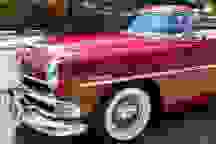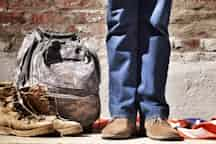In the spring of 1956, my mother received a phone call from my grandmother. We lived in California, where my dad was stationed at Edwards Air Force Base in the Mojave Desert. I was ten years old, my little brother was five, and my older sister was fifteen going on thirty. My sister was usually off with her friends listening to Elvis Presley, who was all the rage among teenage girls. So, my little brother and I spent hours exploring the desert that surrounded the base with a neighbor’s kid, Gene Fiaconni. Gene was an expert at finding tortoises and various snakes, and he knew which ones to avoid.
My mom and my grandmother usually communicated with letters since my grandmother was living back in Texas, long-distance phone calls in our family were rare because of the expense. We usually only talked with our grandparents on holidays and special occasions. My little brother, Jimmy, and I were watching the Cisco Kid when the phone rang. Of course, when we heard that mom talking to grandmom, we were so excited we started jumping up and down. My little brother was laughing and yelling, “Oh, Cisco!’ and I was laughing and yelling, “Oh, Pancho!” Our mom was unsuccessfully trying to shush us. It was total mayhem in our tiny kitchen. She finally resorted to those magic words kids have been responding to for years, “Wait until your dad gets home.”
Our mom’s mother was our favorite relative and always spoiled us when we were with her. Of course, it was easy to spoil a child back then. You just said, “Why don’t you kids go on outside and play. You can do your chores later.” So, as you might imagine, we loved staying at grandmother’s house. It was a different time, and we always finished our chores.
One of my grandmother’s closest friends from church had died suddenly, and my grandmother was distraught. This woman who had passed away had taken care of my mom, on occasion, when she was growing up. My grandmom and her friend, Louise, whom she affectionately called “Weezy,” were extremely close. They went to church together, quilted, and shopped together, and I dare say, when they were younger, they partied together. My grandad used to say, “They were two peas in a pod, why if one of them sat down on a pin, the other one would say ‘Ouch!’” My grandmother had called to ask my mother to come back to Texas for a week or two, be at the funeral, and be of what help she could to my grandmother and Weezy’s family.
My little brother and I were ready to go. My sister, Patsy, was more reluctant, and she was worried about missing her friends and actually started crying when mom told her in no uncertain terms she was going with us. Patsy asked if she could walk over and tell her friend Allison she had to leave for a few weeks, and mom told her that was a good idea.
When my sister left, my little brother and I followed on our bikes. He was still riding with training wheels, but he could hold his own. Her tears were fair game for my little brother and me. We ran around behind her, boohooing and acting like leaving our friends would ruin our lives. I would say, “Oh, what am I going to tell my friends? I will just miss them so-o-o-o much?” And then boohoo some more. My little brother would join in and repeat everything I said, and then we would both just laugh as we rode circles around her. That is until she finally picked up a rock and threw it at me. Hit me square in the mouth and knocked me off my bike. Blood and other bodily fluids shot out of my mouth along with part of my tooth. My little brother started crying and screaming at my sister, “You kilt him, Patsy, you kilt Charles Lee. Momma’s gonna murder us.”
Patsy walked Jimmy and me back to the house and told us to wait in the garage while she went in and talked to mom. “But I’m bleeding,” I said.
“Oh, hush up! Your lip is a foot from your heart! I tell you when you can come in the house.”
As my sister left, Jimmy looked at her with his deer-in-the-headlights look. The kind of look you would have if a spaceship landed in your front yard.
We began our trip two days later, after a quick visit to one of the dentists on base. Jimmy and I were still trying to figure out why Patsy did not get in trouble, but we did. We were relegated to the back seat for the entire trip. My dad had bought a new Ford Fairlane, a blue and white four-door, and it was a beauty. It was our stylish conveyance back to Texas. As we set out on our journey, we were excited, but after looking at Yucca cactus, Joshua Trees, and sagebrush mile after mile, we started to get bored. My sister was poring over a magazine that looked like it was totally devoted to Elvis Presley. Patsy and mom talked about cooking and clothes, primarily. When it came to talking about relatives, Jimmy and I would roll our eyes at each other then go back to drawing airplanes or reading comic books. Our most significant endeavor in the backseat of that Ford was trying to decide if Cisco and Pancho were murdering bad people or killing them in self-defense. It would help to remember that Jimmy was only five years old and wasn’t into complex problem-solving. Jimmy’s response was, “What’s the difference? They dead, right? Like Miz Weezy?”
Patsy turned around in her seat and said, “You two had better stop talking about the dead, or they will come back and get you!”
My mom said, “All of you need to quit talking about things you don’t know anything about. Now is anybody in this car hungry?”
And so it went—all the way to Texas. We were so car weary when we stopped in the evenings. We couldn’t wait to climb into bed and dreaded getting up in the mornings and setting out again.
We finally arrived in Tyler, Texas, three days later. When we pulled up in my grandmother’s yard, she was sitting outside with my granddad and my uncles under this giant Magnolia tree. They all jumped up and came to the car and took turns hugging my mom and picking my little brother up, who never lost that struck dumb look on his face. He had not seen any of his uncles since he was a baby and didn’t know what to expect. Two of my three uncles had served in WW II with my dad and then in Korea, and their idea of fun was to take their knuckles and rub your head. My other uncle, James Dalton, was just glad he wasn’t on the receiving end anymore. When they got through with Jimmy, most of his hair had been rubbed off, and I swear his head was raw from the rubbing he took.
It was an East Texas rough and tumble bunch of redneck, die-hard reactionaries that made up my mom’s family. They all had hearts as big as their home state. They were all well-traveled, but when they returned to the land of their birth, they reverted from the sophisticated cosmopolitan young men they had become to the boisterous provincials they once were.
After an early dinner, my grandmother announced that it was time to go to the ‘Viewing.’ Jimmy looked up at me and wanted to know what a viewing was. My grandmother said, “You don’t need to know because you kids are staying here. This viewing is for grownups.” They told my sister that she was to stay and babysit us. She looked like the dentist had just told her he was drilling. My Uncle James said, “Oh, mama, why don’t you let these kids go?”
My grandmother said, “Because I don’t want any incidents like what happened when they buried your great-granddaddy Marshall, you know when those two Fullilove boys got to wrestling around and knocked the coffin over. Y’all can just stop laughing. It was disrespectful. And old man Fullilove standing there saying, Well, boys will be boys. Somebody should have tanned all their hides, I’ll tell you.”
By now, all my uncles had joined in the conversation, along with my mom, and they were all laughing and cutting up as they reminisced about the Great Fullilove Disaster. Finally, my Uncle Ben said, “It wouldn’t have been so bad if they had put pants on him.”
“Well, the top part is all they usually dress up, but I bet they start putting pants on them in the future.”
“I noticed you looking at him, too, mama.”
“Well, I never!” My grandmother said.
“Oh, that’s okay Thelma, all anybody could talk about after Marshall rolled out of that coffin was how well-endowed he was.” My granddad tried his best to console my grandmother, but he was having as much fun as his kids. “You know that runs in my family.”
“I want y’all to quit this nasty talk, they’s children in the room.” My grandmom said. But she was trying her best to stifle a laugh.
Jimmy and I just stood there and looked from one relative to another, as they joked and laughed and brought life to that cracked linoleum-clad kitchen.
“Oh, mama, why don’t you let them go? I promise I’ll look after them.”
My grandmother finally capitulated. If for no other reason than to get to the funeral home early. Louise’s family wanted my grandmother to sit on a stool beside the casket and sing some of Weezy’s favorite hymns and songs, which my grandmother considered the highest honor that could be bestowed on her. So my Granddad piled my grandmother, my mom, my sister, and two of my uncles into his 1948 Lincoln and said he would return to pick up my Uncle James, my brother Jimmy, and me.
Jimmy and I felt like we were riding in the ultimate luxury on the way to the Burks-Walker-Tippet Funeral Home. My Uncle James asked my granddad, “Well, dad, have you bought any insurance on this beast yet?”
“Well, I was planning on buying some today, but then Weezy died and decided to have her funeral today.”
“Sure, dad, there is always an excuse with you. One of these days, someone is gonna run into you, and you are gonna wish you had insurance.”
Then out of nowhere, another car ran a stop sign and smacked into my granddad’s rear fender. Up until that moment in my life, I don’t believe I had ever heard a louder sound than the sound of metal on metal. Not even Chuck Yeager breaking the sound barrier was louder than that grinding crash. Even though it was just a fender bender, and both cars were able to drive away, my uncle was relentless in poking fun at my granddad for not having insurance. My granddad got so befuddled that when he went to spit his tobacco out of the window, he forgot that the glass was rolled up.
When we finally arrived at the funeral home, my mom wanted to know why we were so late. My little brother said, “Because granddad don’t have no insurance.” I thought my uncle might wet his britches.
We walked in and sat at the back. When it got to the point in the program where the preacher asked folks to line up and say their farewells to Miz Weezy, my grandmother went up and picked up her guitar and started singing ‘Sweet Fern,’ one of Miz Weezy’s favorites. Row by row, the ushers had people stand and walk to the front to say their final goodbyes. I noticed that as people walked past my grandmother to the open casket, many of them would look back at my grandmother wide-eyed and do a double-take. When we finally reached the casket, my Uncle James held my little brother up to get a last look at Miz Weezy. First, Jimmy looked in the coffin, and then he looked at my grandmother as she started to sing, ‘In the Garden,’ Jimmy blurted out, “Miz Weezy is dressed just like grandma!”












